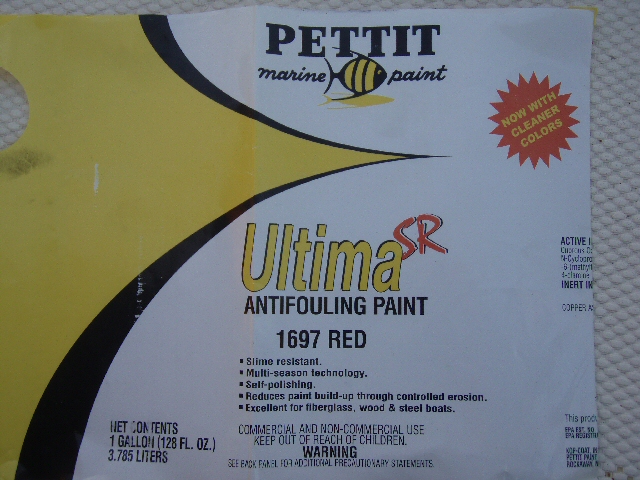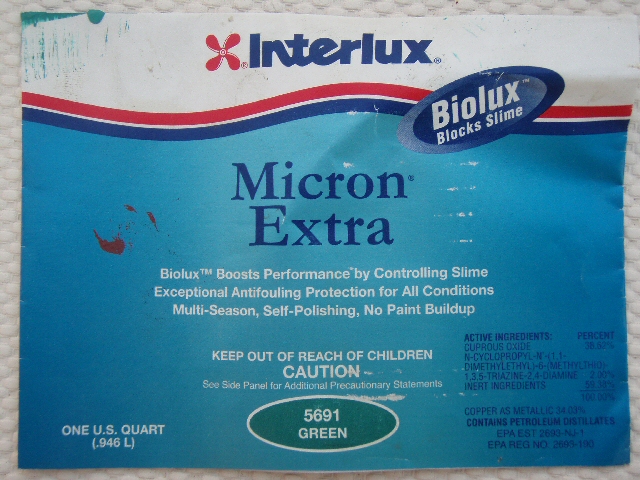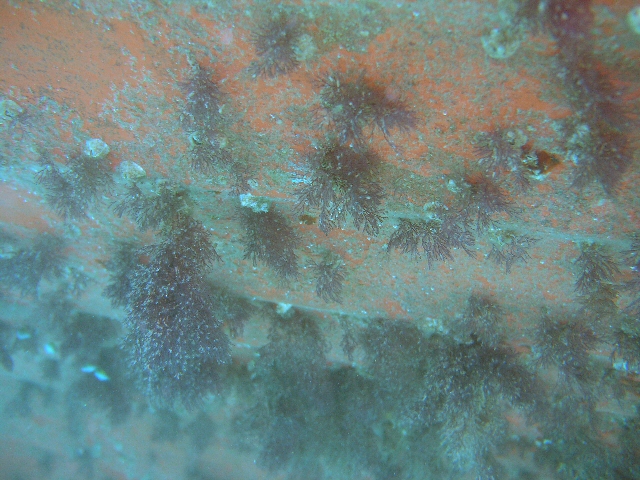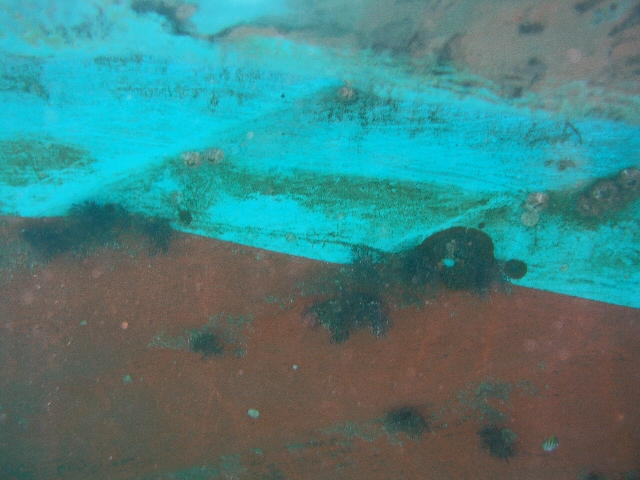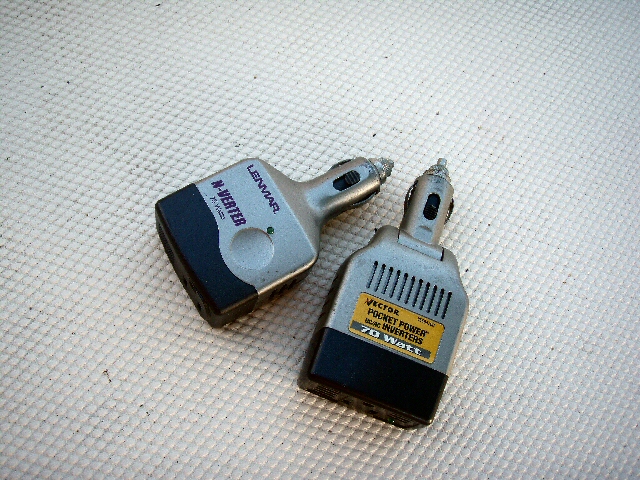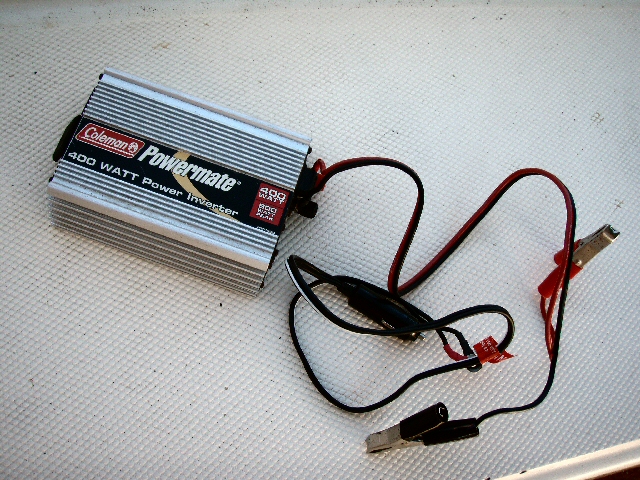Hi all,
Yes, we have been
out, cruising, for three years now! We departed our slip (the last
permanent one we had), on September 15, 2004. This report is a bit
later than our normal September issue date. We were out actively cruising the Sea of Cortes
for the last 5 months and did not want to write this up until we got to
a slip.
We are now in a slip in Marina de La Paz. With a
small boat, why not?
First
and foremost,
Guenevere
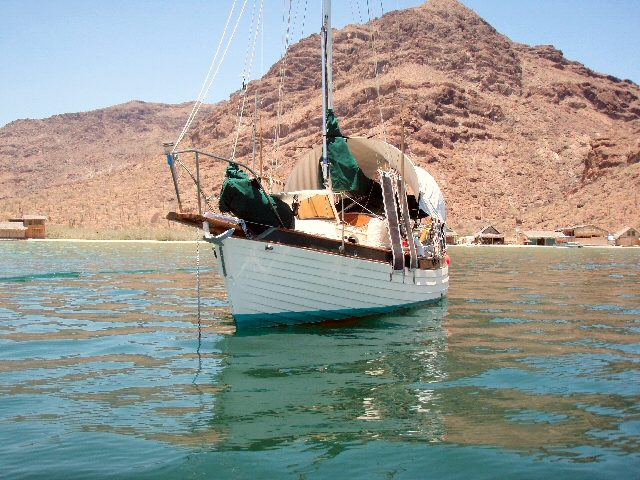
What I said last year was, "She has done us proud in
EVERY respect! We have not come in to one port that we did not get
Ohhhsssss and ahhhhhssss! And she has taken all the punishment that
day-to-day life at sea has dished out to her. She is a very fine and
meticulously put together, high quality boat capable of far more than
we can take! She has really taken good care of us!" AND it still holds
true today! If anything, I am happier now than last year, if that can
be?
The anchor
windlass.
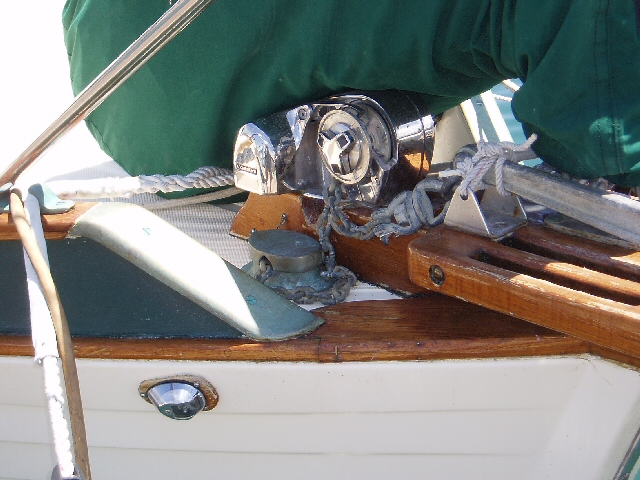
We have been using the new
windlass now since March of 2006, so I cannot give you a lot of details yet. BUT, It
is my feeling that a lot of the makers of marine
equipment (NOT just Sampson Lowerance and Lewmar) feel that if they are
designing items for boats under 50 or 60 feet,
they only need to design for weekend users. I expect that the Lowrance
windlass
would have worked for a long time under only weekend use. This is
something to consider if you are planning to head out in a smaller boat.
So far, we have used this windlass 42 times. That is 42 real downs and ups.
Autohelm 1000
autopilot
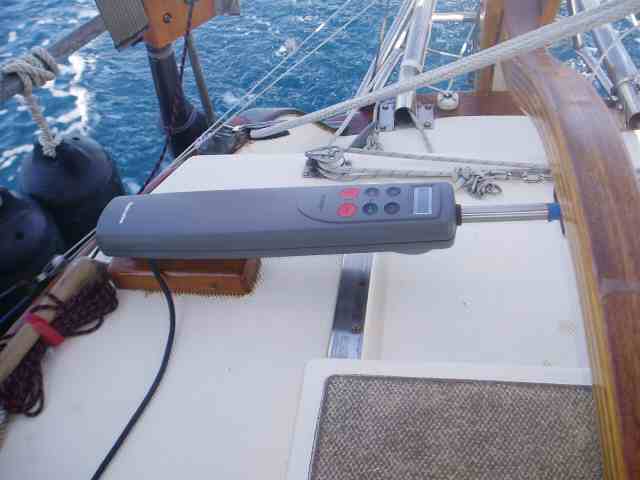
This year it
has worked very well with only a couple of problems. We only use
it when the engine is running, so we do not worry
about the power it uses.
The first problem was the fitting for the remote control. The housing
on the remote attached to the cord broke! It did not effect the use,
but was a disappointment. By the way, we like the remote a lot. When under power we can
sit on the bow, and steer the boat!
The second problem is that it seems to cut out at times, not
often, but it did just quit. It MAY be just a loose wire. I will have
to track this down.
Unisolar flexible
solar panels (4 each) and one Kyocera KC-85
Each Unisolar solar panel is rated at 1.94 Amp. They work well
and are easy to put out once we reach anchor. They roll up nicely and
stow in the aft cabin when not in use. When we prepare for a hurricane, EVERYTHING MUST stow below!
If it were not for the freezer,
they would be way more then enough to power the boat all the time. BUT, we have added a KC-85 (85 Watt) panel this year.
PLEASE read my commentary at the
end of this report regarding power and water.
Link-10 energy
monitor
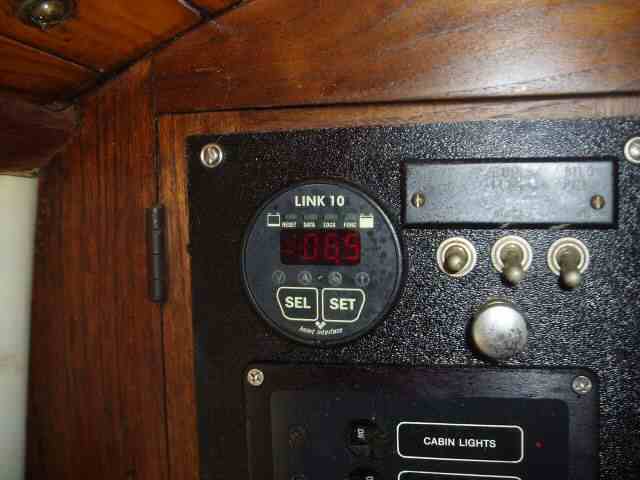
This is one of the GREAT magic items we put on board! Before we got
this, I would go behind Jill and turn off the lights to conserve power.
I never knew exactly how much we had, or had left. I was driving Jill
crazy. NOW, all I have to do it take a look at it and we know our
status! The BIG bonus is that you can make sure you do not
over use your batteries! That is, do not use them beyond 50% discharge.
This greatly extends there life and SAVES a LOT of $$$$$.
A new note to add about the Link-10. It does NOT take into account the
battery voltage. That is the actual state of charge of the battery! So,
as you use your system and it is no longer new, you must reduce the
total amount of amperage available from your batteries. If you do not
do this, you could wind up with all 4 LEDs on (the gauge stating you have
full batteries) BUT, have a battery voltage of less than 12 volts
(battery almost empty). Don't ask us how we found this out!
Sun Covers
Here in the Sea of Cortez they ARE A MUST! You can
NOT live without them. We had our canvas guy make us a cover that goes
from our dodger to the boom gallows and can stay on when we are
sailing. WE LOVE IT. But that alone was not enough.
We now have a ShadeTree sun cover.
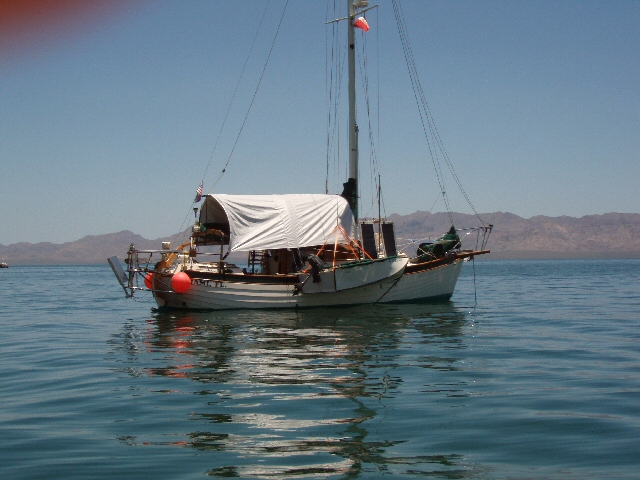
It goes up easy, as far as covers
go. It is strong and we are able to "reef" it easily at night. We reef
it every night in case of a Chabasco (sudden storm).
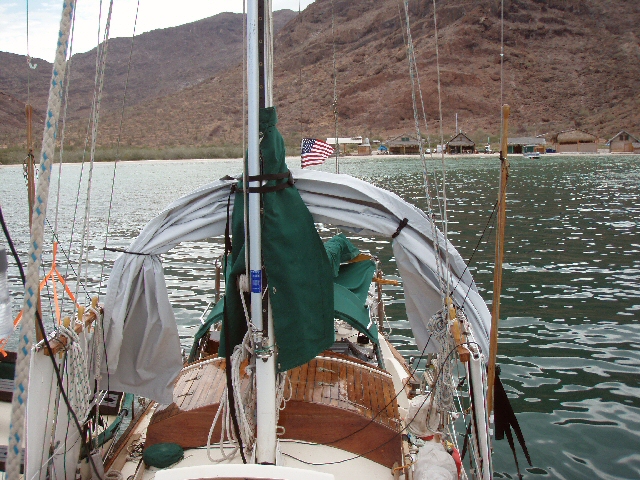
It cools the boat
off by at least 5 degrees! At least it feels that way. During this
summer, the inside temp of Guenevere never got above 97 Degrees F. We
visited other boats that had a cabin temp as high as 107 Degrees F.
We did have one problem with the ShadeTree. One of the rods that
support it broke length ways. I taped it up and it's still usable. I
plan to contact them and see if they will help out.
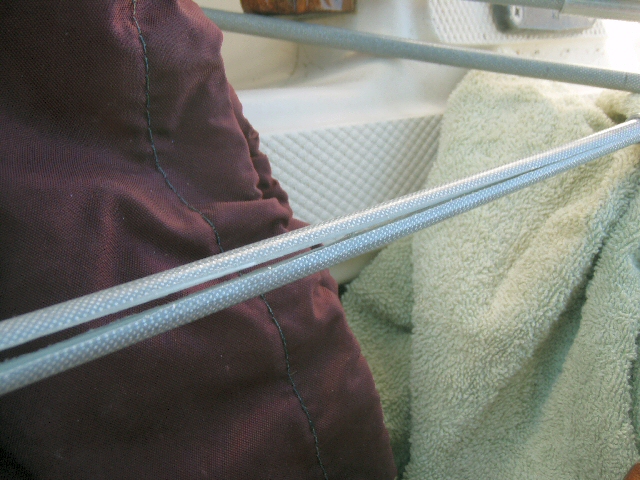
Porta-Bote dink
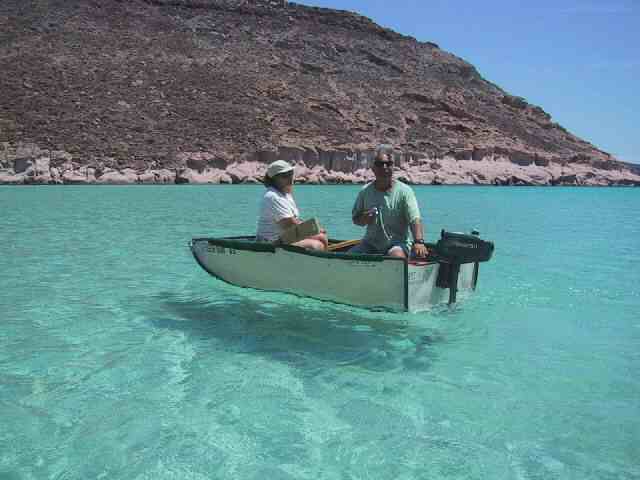
Our 8 foot
Porta-Bote
is still working good after 12
years! We bought a set of the new plastic seats in 2003. They are a LOT
lighter than the old wood ones and we were very happy with them. BUT,
after only one year,
due to the heat, the plastic seats are breaking. The middle support
that keeps
the boat bottom ridged, and is hinged in the center bottom of the seat
has pushed it's
way up into the foam center of the seat. This slows the dink down when
motoring as the bottom does not stay as ridged as it should. I tried to
fix them when we were back at a dock. It did not work well.
Here is what the OLD seat bottom supports look like.
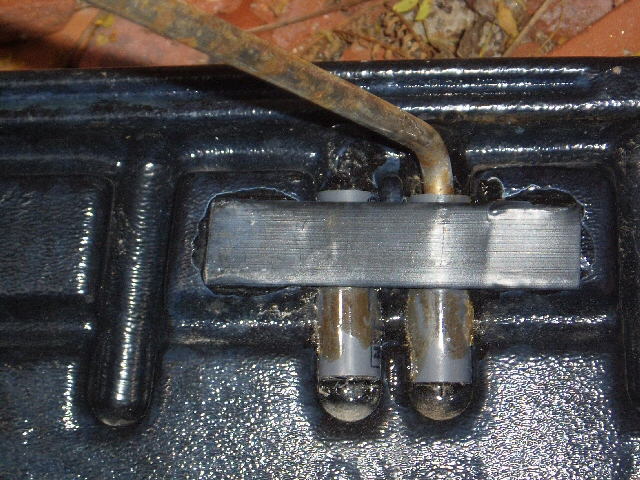
This shows how the metal seat/bottom support hinges on the underside of the seat. This is a good, unbroken support.
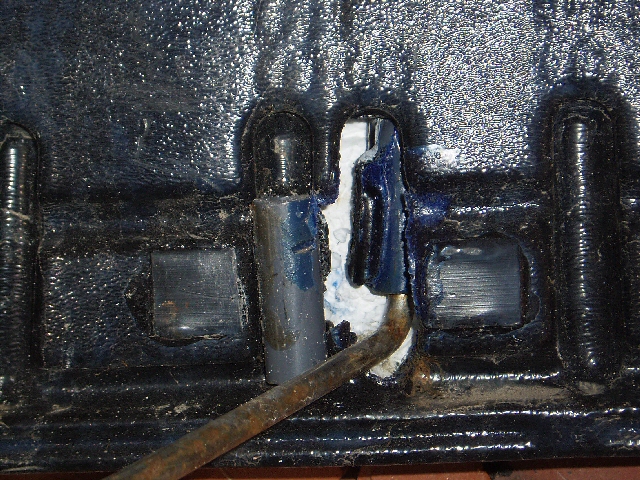
This photo shows the failure mode. You can see how the metal support
has broken through the bottom of the seat and is working it's way
through the white Styrofoam. Once the Styrofoam breaks away, the
seat can drop about 1.5 inches and the bottom is no longer ridged..
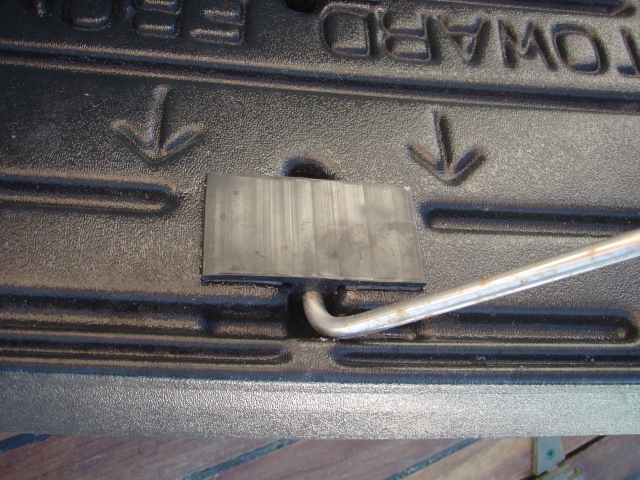
The new seat support system is
working good so far. My next step is to paint the seats white so they
do not get so hut. Jill is also talking about making seat covers for
them.
At one
anchorage we visited last year, there were 5 boats, all with
Porta-Bote dinks! AND, we all
had the same problem with the seats. When we got back to La Paz, I
managed to call the
Porta-Bote company. I was informed that they had redesigned
the support. They were very willing to supply a new set of supports
that could be retrofit to the old seats. I was informed that they
wanted happy users!
We have now talked to a lot of boats using
Porta-Bote for every day
dinks. When used like this, they get a LOT of usage. We have to say
that we think they are a great dink for use in the Sea of Cortez. The
beaches here can be smooth sand or rocky. It's nice to not have to
worry about just running it up on the beach. When other boaters stop
off the beach and wade in, we can just run up and step off.
We have heard that some people have had problems on the mainland,
trying to get to the beach through any sizable surf. We know of at
least one that was upturned heading through the surf. But then, we have
also heard of a number of inflatables doing the same. We have also
heard from other
Porta-Bote owners that had no problems going
through surf. We do notice that the bow of the
Porta-Bote tends to be a
bit low and can scoop water if it drops.
Another good point is that we do not need wheels on the stern of the
dink like the inflatables with big motors. It's light enough to just
pull all the way up and out of the water.
Other than that, I get about 8 Knots of speed out of the 3.5 HP motor
when it's on its' plane.
Two Hella cabin
fans (one over each berth)

Without these, we could NOT have spent even one summer here in the Sea of
Cortez! During the summer, they run mostly 24/7 when we are on
the boat! Both fans have now had some problems. On one, the fan blade
has come loose. I replaced it with a new unit. The other has been slow to spin up and at times makes a screaming
sound. I think they have done GREAT duty for the amount we asked of
them.
According to our plan we purchased two more just like them and I
installed one this year. The other fan seems to have stopped making
the noise. So it will stay in place until it stops working. We also
bought a couple
of "clamp-on" fans to use around the boat (see in personal items area).
In the Sea of Cortez, during the
summer, you can not have to many fans!
Icom RAM Mic
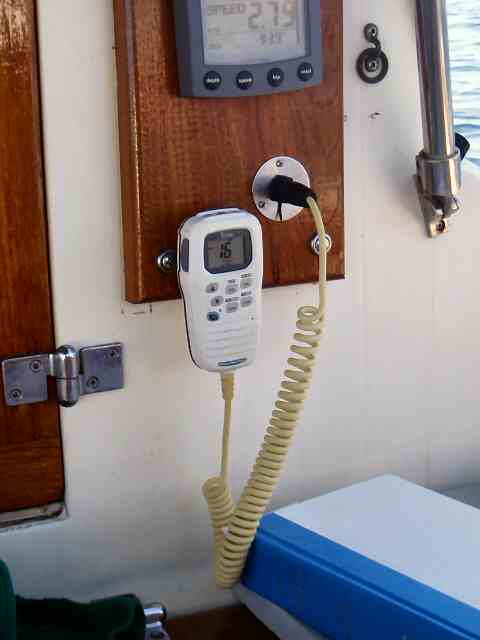
Last year, the RAM mic crapped out! I had a problem with
troubleshooting it down to the radio, the mic, or the cable. So when
we were in the US, we bought an identical replacement for all the
parts. It turns out it was the RAM mike itself. I am unhappy with that.
I think it should have lasted more than one year! The cord also
darkened up over the year. It says it is for use in the cockpit, but
once again, I think it is aimed at weekend use only! I am not sure what
I would use if I changed, it's very nice to have the full ships radio
in the cockpit! All summer we were talking to other boats trying to use
handhelds in the cockpit and they were ALL having problems! Batteries
dying and low power output makes relaying on a handheld less than
optimum.
This year, the mic worked fine and is still working.
Silva Compass
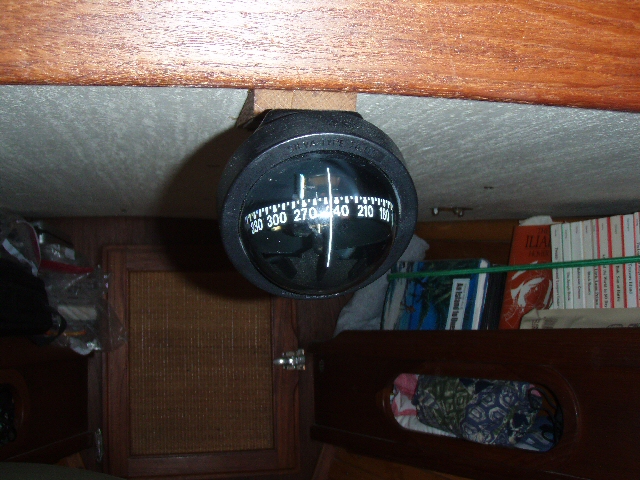
This is a small "Tell Tale" compass that we have just
over our V birth. We can see it at night to let us know what direction
we are pointing. This helps a LOT when at anchor.
Fuel Can
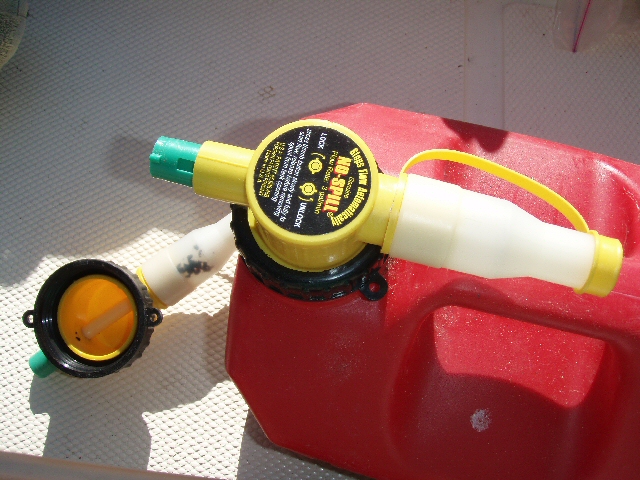
We found out about this type of fuel fill can on the WEB. It is without
a doubt the BEST can for filling your dink motor! We have filled the
dink in even rough water without spilling a drop!
BUT (don't ya hate the "but"!), the top is very sensitive to sunlight.
The tops only seem to last one year here in the Sea, even when covered
with a white cloth.
Hand Held Anchor controller
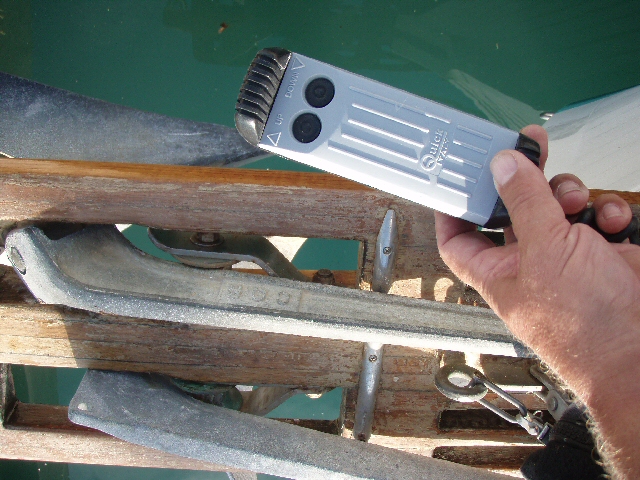
We use a hand held anchor windlass controller. It connects to a plug up
by the bow and can be removed and stowed inside when not in use. Any
time we are at anchor, it is plugged in and clipped to the lifeline at
the bow.
Hand held Depth sounder
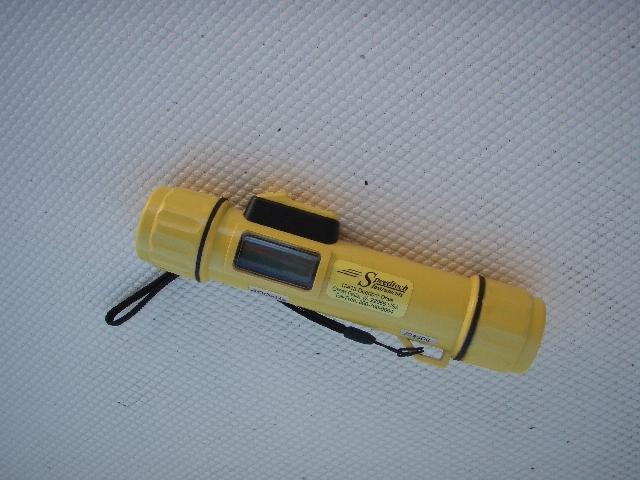
A great small toy to use from your dink. We have anchored out and run in using the dink to make sure we had the depth.
Morningstar solar Charge Controller INSTALLED AND FAILED THIS YEAR
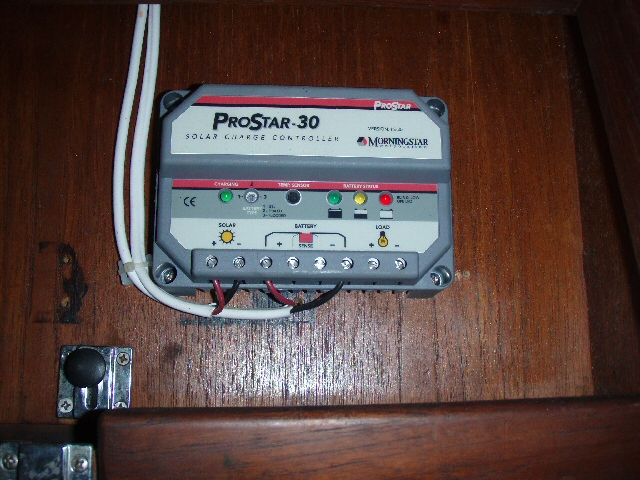 This item was a real disappointment! We installed it when we put our
KC-85 solar panel on due to the larger amount of power we anticipated
having. Once connected, (an easy job) it worked just fine. It continued
to work for most of the time. Then one morning I looked at it and found
that the green LED said power from the panels was good, but NO power
was going to the batteries. ALL of the 3 right LEDs were out. I tried a
reset with no help. I disconnected it for 3 hours, reconnected it and
still no joy. So as you can see in the photo below, I went back to an
older, more simple controller. I think I will get a second simple
controller as a spare and stick with that!
This item was a real disappointment! We installed it when we put our
KC-85 solar panel on due to the larger amount of power we anticipated
having. Once connected, (an easy job) it worked just fine. It continued
to work for most of the time. Then one morning I looked at it and found
that the green LED said power from the panels was good, but NO power
was going to the batteries. ALL of the 3 right LEDs were out. I tried a
reset with no help. I disconnected it for 3 hours, reconnected it and
still no joy. So as you can see in the photo below, I went back to an
older, more simple controller. I think I will get a second simple
controller as a spare and stick with that!
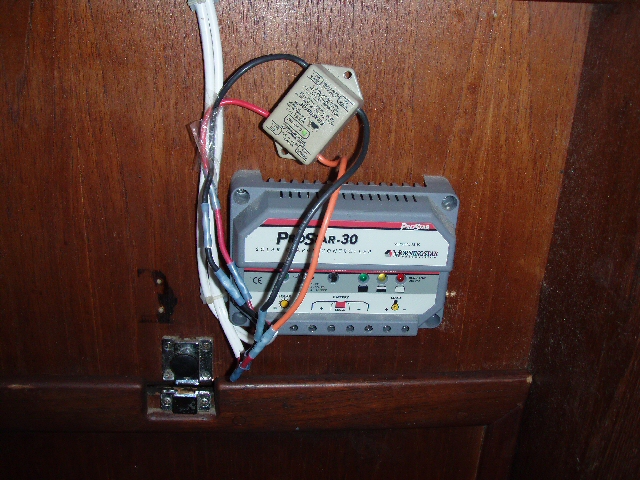 Bottom Paint - FAILED THIS YEAR
Bottom Paint - FAILED THIS YEAR
In late September and early October, 1996, we sanded ALL of the old bottom paint from
Guenevere. On 6 and 7 October, 1996, we coated the bottom as directed in the
instructions that were provided with the CopperPoxy.
It's official, the CopperPoxy bottom stopped working last year. We were
finding hard growth all over the bottom. When we bought it, the product
said it would last about 10 years. I guess they had it correct.
If you are coming to the Sea of Cortez,
DO NOT USE THE FOLLOWING.....
Pettit Ultima SR or Interlux Micron Extra!!
The above photos show the bottom after JUST TWO (2) Months!
On our next bottom job, we are going back to CopperPoxy, or a
CopperPoxy like product! At least it WORKED in the SF Bay area AND down
here!
This time we did not do another CopperPoxy bottom as we were concerned about
excessive buildup. As it turned out, we did NOT need to worry. Once the
boat was out of the water and the yard did a very good pressure wash,
we found the actual metal copper had all leached out of the epoxy. Once
the copper was out, the remaining epoxy was like a sponge. So, the
strong pressure washer took all of that off! We were back to a bare
hull.
Trident propane Gas Control and Alarm unit. FAILED THIS YEAR

We have found the Trident gas warning to be a
pain! It was very SENSITIVE! We cannot use spray Pam (or any other
aerosol spray) inside the boat without it shutting down the gas and
ringing the alarm! This year it failed! The alarm would go off and it
would NOT shut down the gas! We have disconnected it for now and may
look for another brand of sensor/alarm.
Propane Gas shut off valve FAILED THIS YEAR
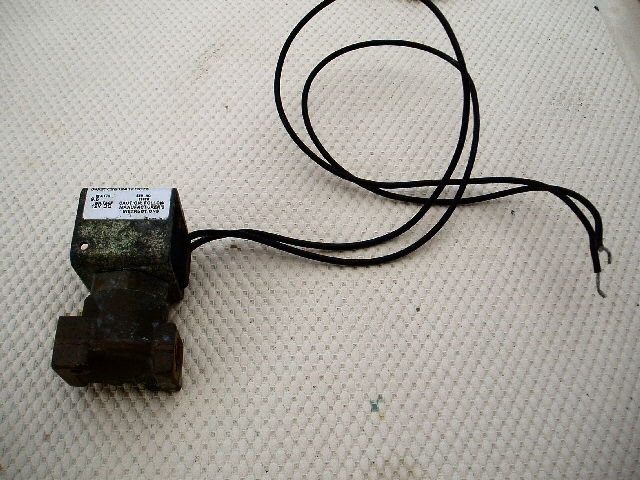
The
propane shut off valve failed this year. The failure mode was that it
started to not completely open. It made the system look like we were
running out of fuel. The stove flame was getting smaller and smaller.
Once replaced, the system was back up working fine.
Another note, here in Mexico, almost all propane hardware is VERY easy
to get, and MUCH less expensive than in the USA! BUT, they do NOT
use shutoff valves!
Belmar MC-412 Alternator Controller FAILED THIS YEAR
This year our original Balmar MC-412 alternator controller failed. It
just would not start at all!. I was in an area that I could get a new
controller shipped/bused to us, so I replaced it with a newer MC-612
model. So far, so good. It gives a lot more info on the system as it
has a numeric readout. I will let you know more later.
Here is a photo of the new 612 in it's new location. Here I can see the
readout from in the main cabin without putting my head close to the
engine!
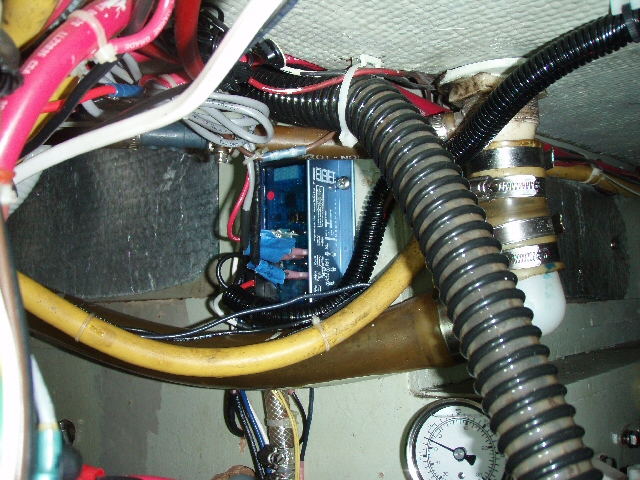
We do have the original alternator aboard that came with the Yanmar.
But it is only a 35 Amp unit and we decided to not use that unless we
had to. This year I am planning to put a spare controller aboard!
"Fat Man" cooking timer.
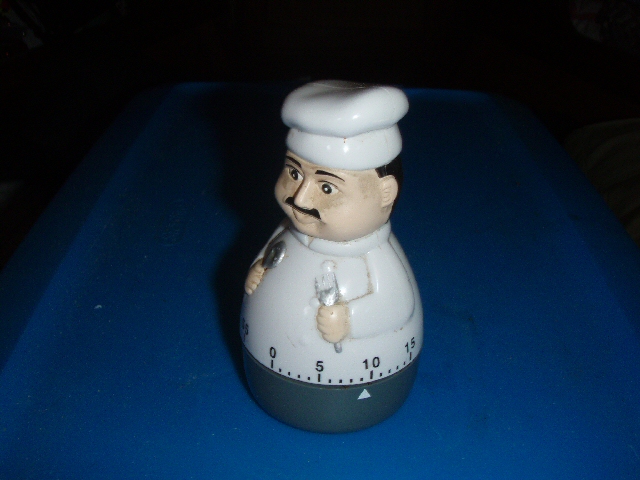
This was given to us as a going away
gift. When we got it, we were not sure if we would use it or how long
it would last. To date, we have used it almost EVERY day when have been
aboard, and it's STILL working!
Creative NOMAD Zen Jukebox MP3 player

Jill and I each have one. They hold 30 Gig. That is a LOT of music and
sound recording. We have most of our music collection on them. We also
have over 1,500 hours of Old Time Radio shows on them. Stuff
like Superman, Gunsmoke, and other radio series. It makes for a
fun evening!
Noise Canceling Headphones

We have 2 sets of
Panasonic Noise Canceling headphones. They are working very well to
listen to music, and ALSO to listen to the radio NETs when the
engine is running. They remove a LOT of the outside noise so we can
hear what we need to.
Zapper bug swatter
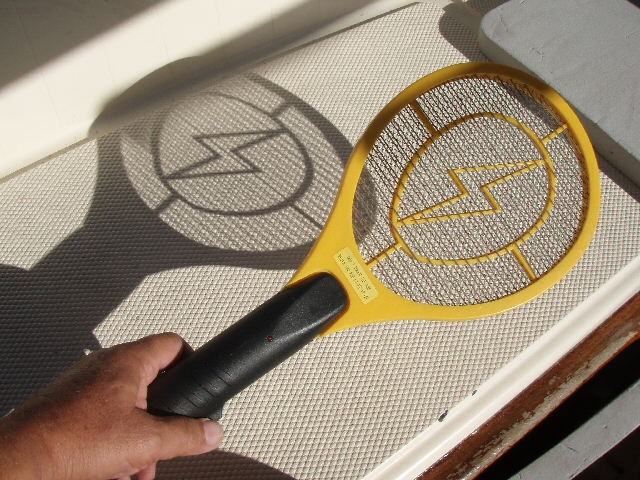
I picked this up as a sort of a joke when I was in the USA. They are
now selling them all over here in Baja also. They work wonders! And the
sound of a loud ZAP any time you make a direct hit makes it fun to use!
When the boat was swarmed with Bees, it was one of my major defenses.
Movable fan
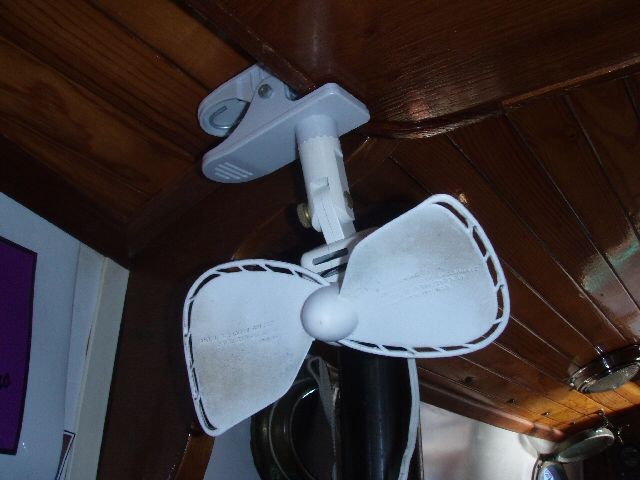
You can NEVER have to many fans in the Sea of Cortez. We now have 2 of these and use them all over the boat!
Digital still Camera

We are now using
this Olympus Stylus 720 SW digital still camera. It takes 7.1 Megapixel
photos. Best of all, it's waterproof to a dept of 10 feet AND shock
proof for a fall of up to 5 feet.
At one point this
year I was in the water next to the boat. Once I got back aboard I
discovered that I had left the camera in the pocket of my swimsuit! It's
still working fine! And the photos are very good.
Inverters, small and large
Instead of putting on one large inverter, we went with a number of
smaller ones. That way, if one fails, we have a spare to take it's
place. This is working out quite well for us. So far we have not had a
problem with any of them working for charging and running our on board
gear. But we do not have a lot of 110 volt stuff aboard.
Raid
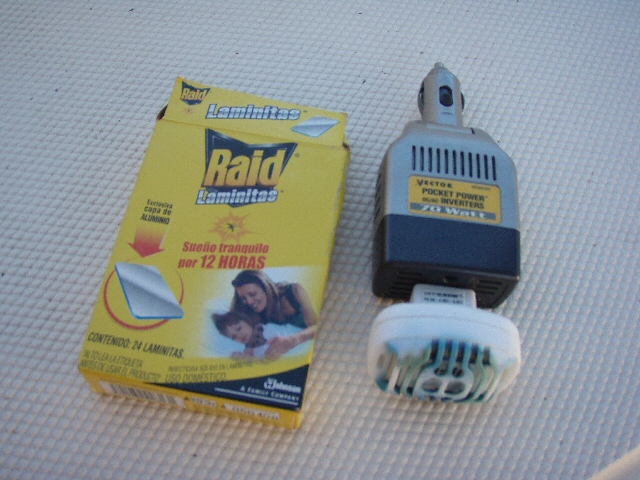
When we in the market, we
purchased a small Raid brand insect device. You put a small pad in a
chamber in it and the unit warms it up a bit to release an insecticide
to kill bugs. We plugged this into one of our small inverters and used
it a couple of nights when we were anchored near an island that had
lots of Bo-Bos, No-See-Ums and flies. It seemed to work well and
used less than 1 Amp of power. It's not something we used all the time,
but we were happy we had it along when the bugs showed up in the
evening.
Infrared Thermometer
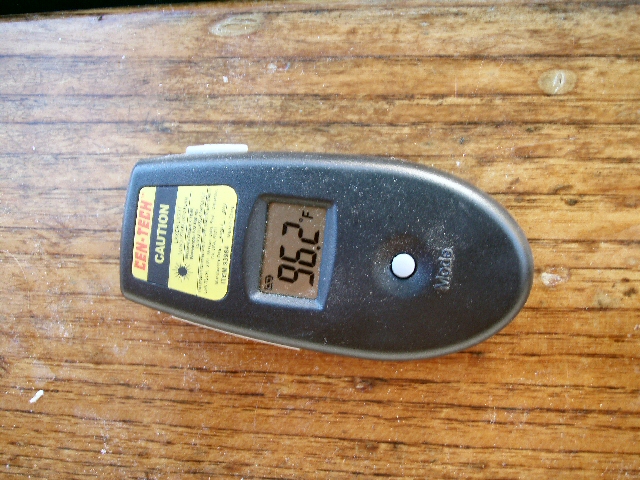
This is a fun toy that is also useful! We used to to check on the temp
of the alternator and engine when in use to see if we might be
exceeding specs. I also used it to get the temp from the alternator
pulley. As the belt loosens up, the pulley temp goes up. So I made sure
to adjust when needed.
Wind Speed meter
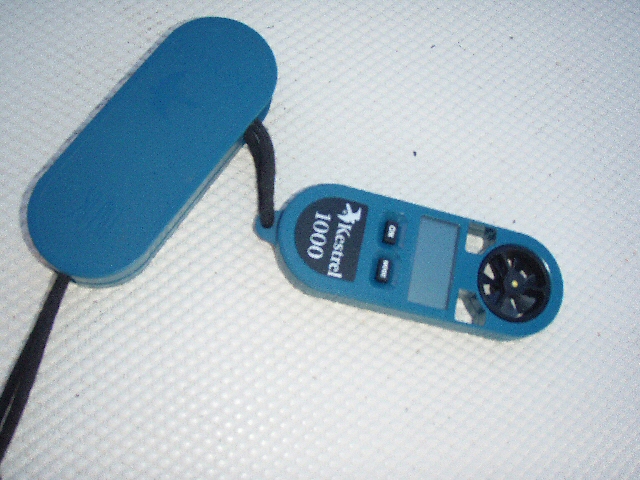
This is another handy toy. We have
always seen it as the wind you have is: too much, just right, or not
enough. But, this puts a figure on it.
Solar light
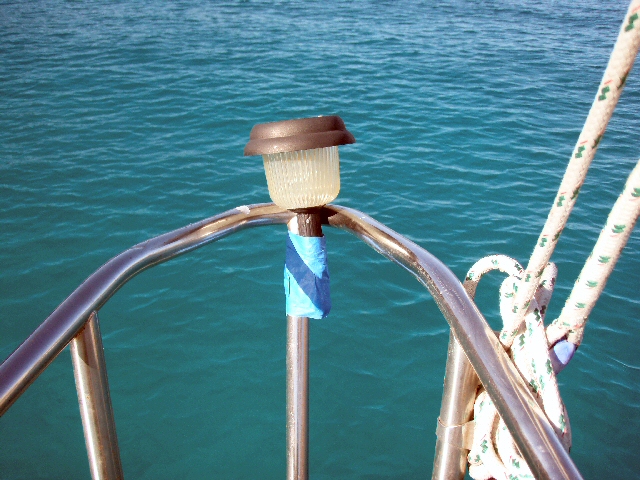
We put this solar powered garden
light on the bow. We also have one on the back of the boat. That
masthead anchor light might be great for legal use, but when the Panga
fishermen are screaming home on a dark night after a full day of
fishing, I can tell you they are NOT looking up! this is very cheap
insurance!
Another note on anchor lights. We have seen a lot of boats with LED
masthead anchor lights. BEFORE you get one, take a look at how one
looks on a boat at night with no moon out. Look at it from at least 5
boat lengths away. We have seen a lot of them that you could NOT tell
the difference between them and a star. An anchor light MUST have a
color different from a natural star!!
Electronic Game

I just had to add this item. Jill just LOVES to play this one
and it has lasted us all the time we have been out. AND, in the last 3
years, and MANY MANY HOURS of use it has used just two AAA batteries.
Solar Iron
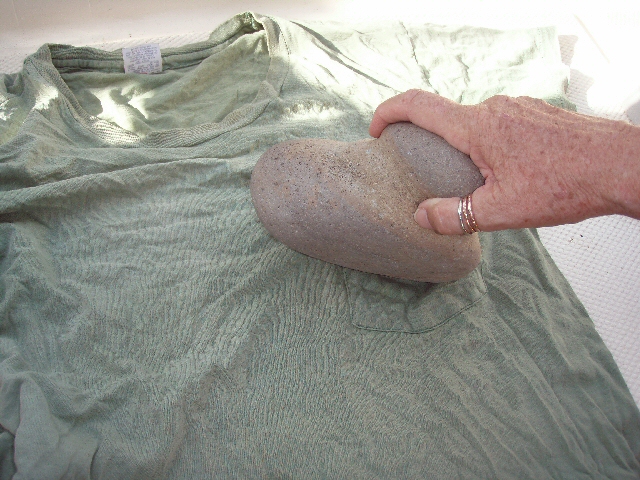
Jill has got to
keep our cloths ironed so we do not look bad when we are visited by the
passing Dolphins. This solar Iron works wonders as you can see......
GRIN!!
| Hall of Shame (Gear we dumped) |
The first anchor
windless.
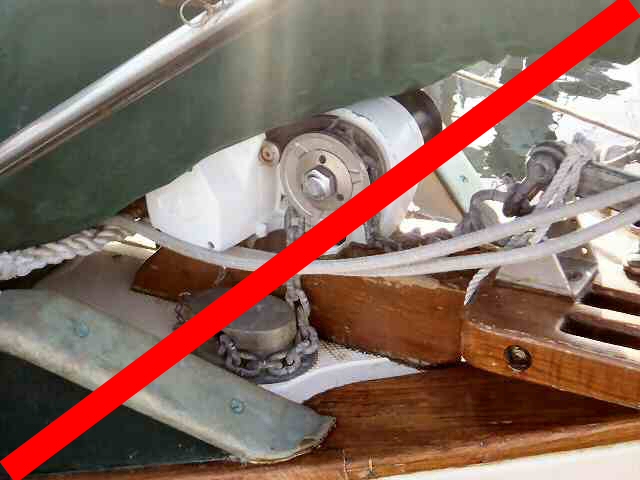
I just did a quick review of our ships log. As it turns out, I used this Windless 37 times.
ONLY 37 times!!!!!
At US $699.00, it cost me about US $18.92 EACH TIME I used it!!
BAD BAD BAD
We HAD a Sampson Lowrance 600 GD electric.
Shortly after we did the 1st year
report, the windless STOPPED
pulling the anchor up. Last time I checked, that was the only reason
for a
windless.
The symptoms were that the
anchor would fall just fine, but
would not come up. Also, the circuit breaker would NOT pop. That is,
the
windless was not overloaded.
I wound up troubleshooting by
opening the anchor
locker, cutting the power leads and going directly to a small
motorcycle type
battery. It still did not work.
I called the support line and
the first thing the guy said
was that I must have overstressed it. NOT ONCE did I leave the anchor
set
without the manual stop set. I NEVER allowed the boat to ride to the
anchor
just on the windless!
As it turned out, inside the
unit is a roller bearing that
only spins one direction. I did not know they made such a
thing! That bearing
had gone bad. The design is that this is what stops the anchor from
falling
until the switch is made. In my opinion, this is very poor
engineering!
I once again called, and you
cannot purchase just that bearing.
Naturally, you have to get the kit with ALL of the unit’s
bearings. And oh, by
the way, that bearing MUST be pressed in and out. And, it MUST be
pressed in
the correct way!
The outcome is, we were trying
to go out and it was faster,
better and cheaper to just replace the windless! So, that is what we
did. We
now have a Lewmar Pro-Series H700.
Newcon Gen 1 night
scope.

Don't waste your $. Just no use, at all.
Raymarine Tridata
depth/speed
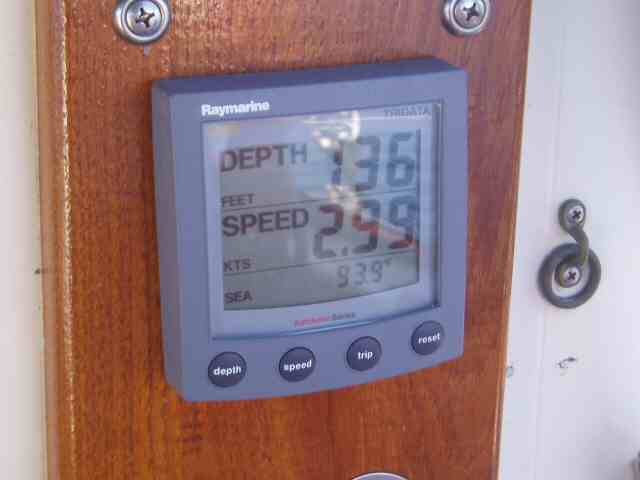
Last year I said - "What can I say, This was $$ down the tubes. As far
as the speed indicator goes, it never did a good job. We installed it
just as we were about to head out. I ran the measured mile on the
Oakland estuary 4 times (as called for in the instructions) to
calibrate the unit. By the time we got to Half Moon Bay I was unsure of
it and was positive it was no longer accurate by the time we got to
Monterey Bay. Even after adjusting for currents. Off of Santa Barbara,
it just quit reading any movement. I keep taking it out and cleaning
it, but it's not worth the effort. I now stick to the GPS for speed."
We
still have this on board, only because I am to lazy to remove it and
fashion a new board. And, we do still use the depth sounder. When I can,
my plan is to remove it and put in 2 depth sounders (different
frequencies). That way, if one quits, we will have a backup. A couple
of times I have wished for two depth sounders.
| A
bit about water makers and power. |
We put the information that
follows together during last year in the Sea of Cortez. Please note that IT IS HOT in
the Sea of Cortez
and that what follows is our thought only.
Water makers
Do
you have one yet? If not, here are a few things that you
may want to know before you purchase one.
Asking a manufacturer what the
output of his unit is only
gives you a number to compare units. DO NOT think that you will
actually get
the amount stated in the advertising. The actual
“usable” amount of water
(product) you get from a unit depends on a lot of different factors!
First, the temperature of the
intake water makes a big
difference. Hotter (up to a point), gets more product water, cooler
gets less.
The salinity (amount of salt)
in the water makes a
difference. More salt, less product.
How long after startup does it
take to start getting good
product water? 5 min or more?
How often do you need to back
flush the unit, how much water
is required? If the unit needs to be back flushed every time it is
used, and it
takes 2 gallons, you need to subtract 2 gallons from the total product
water
made, EACH TIME!
How often do you
“NEED” to run the unit? Some units MUST be
run at least once every 3 or 4 days. If not run, you need to back flush
it, or
preserve (pickle) it.
Over time, the unit will start
to produce less product water
due to normal usage of the filter element.
One other thing you need to
think about is if you plan to
just let the water maker run without you being present. I
don’t think that is a
good idea, but some people do. When we make water, it goes into a
separate tank
and I sample it (taste test) BEFORE it goes into our main tanks.
Having said all of the above,
we seem to be getting about
70% to 75% of the “rated” product output.
How much water do you need to
make? For us, that amount is
about 28 gallons every 4 days. That is, we need per person, 1 gallon to
drink,
½ gallon for cooking, and 2 gallons for washing. That is 7
gallons per day and
we try to make water every 3 to 4 days.
In the heat of the Sea of
Cortez, 1 gallon a day to drink is
the minimum! And washing off after a day of swimming may not be
critical every
day, but after a few days, YOU NEED IT! This year, there was a drought
on the
Baja and a lot of the animals were dying due to lack of water. So water
was hard
to come by. We felt that a water maker was a necessity.
Of the other boats we met and
talked to, only one had a
working “parts per million tester”. A lot of boats
bought them, but all now
just taste the water. We did not talk to any boat that was satisfied
with a low
output water maker. It is AMAZING to watch the fresh water flow out of
the product water hose. You look at it and ask yourself, "is that all
it's making? is it working correctly?" This does not apply to emergency
units!
Make sure you have it working
BEFORE you depart on your cruise! Getting it worked on once you are
away from your home waters is HARD TO DO!
Now on to how much does it
cost? Not to purchase, but how
much power does it take to operate.
POWER
REQUIRED
By now, you know all of the
systems we have aboard
Guenevere. So you know we need a bit of power.
The first year we were in the
Sea of Cortez, we had 4 each
32-Watt Unisolar flexible Solar panels. During the heat of September,
this was
WAY LOW! We had to start the engine every day or two.
The major draw of power is the
refrigerator. It draws 4 Amps
per hour of usage. We have super insulation, and if we did not open the
box,
the solar panels worked just fine. But, the real draw was the 2 gallons
a day
(or more) of water that we cycled into and out of the unit.
During a number of talks with
other cruiser at beach
bonfires, most boats were down by 50 to 70 Amps each morning. We were
right in
there with the others, just a bit higher than the lower numbers.
You may think that this is not
a problem, but let me tell
you how unhappy you can get sitting in the boat running the HOT engine
on a
VERY HOT day! It was also getting so hot that the temp sensors on the
alternator and battery would lower, or cut off, the alternator output!
That
would require us to shut down, wait a few hours and start over! A BIG
PAIN!! Not even talking about how BAD it is to use your main engine to
just charge the batteries!!!!!
The
solution?
During the summer here in the
sea, we have almost no wind a
LOT of the time. Not one cruiser we talked to was happy with their wind
generator.
We talked to about 6 or 8 boats about their units.
Our solution - MORE
SOLAR POWER.
How
much do you need?
We have come up with the figure
we think we will put on
board. See if this helps you.
We know that our water maker
uses about 14 to 18 Amps to
run. Our refrigerator uses 4 Amps. So we plan to have about 20 to 25
Amps in
solar panel generation capability. That will be 1 each 85-Watt panel on
the
stern rail aft of the back stay and forward of the Monitor wind vane. The current 4 Unisolar
panels. Plus 4 more
ridged panels mounted (removable) from our pin rails. This will allow
us to add
and remove panels as required.
The logic is that at anchor,
once every 3 or 4 days, we can
fly all panels and during the four sunniest hours, make water, run the
refrigerator
and still be able to trickle charge the batteries. On the other days,
we should
be able to charge the batteries full by noon. Also, on an overcast day,
we
should still be able to fully charge the batteries.
Our last Position
When we send an E-Mail from Guenevere, our system automatically reports
our latest position. If we have sent an email with the last day or so,
you can call us up on a map and see where we are! To do this
just click on the a link I have placed below...


















